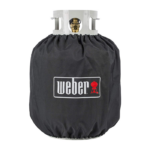Propane tanks are generally very safe but contain highly combustible materials and are not infallible. Whether you’re packing away your grill for winter or wondering where to store a spare propane tank, knowing the ins and outs of safe propane storage is key.
In this post, we’ll walk you through the basics of BBQ propane tank storage, covering everything you need to know about where to store the propane tank for your grill. We’ll share guidelines for safe outdoor BBQ propane tank storage and essential safety tips for those who prefer storing a tank indoors. By the end, you’ll know exactly how to safely store your propane tank so you can fire up the grill without worry.
Let’s get grilling.
Safe BBQ Propane Tank Storage
To keep your propane tank safe and ready for grilling season, there are a few basic rules to follow. These guidelines apply to any propane tank, whether it’s full or empty, old, or brand new.
1. Store outdoors whenever possible
The safest place to store your propane tank is outside.
Tanks should be kept in a secure area, away from heat sources and ignition risks like matches or cigarettes. You should also keep them away from air-intake sources, such as air conditioners, radiators, or heat vents because if your tank does leak, these openings could allow propane to seep into your home.
If you live in a colder climate, don’t worry about storing your propane tank outdoors over winter. Freezing temperatures don’t pose any safety risks, and you won’t lose any propane over the winter.
GRILL SPOT TIP: Propane tanks can get wet, but moisture can accelerate the corrosion process. If your tank will be stored in an uncovered outdoor location, it’s safe to cover it with a propane tank cover, or loosely with a tarp. If you can, avoid storing it in a place where it can get buried by snow.
Shop for propane tank covers:
2. Use a non-combustible base and keep the tank upright
Place your propane tank on a stable, non-combustible surface to keep it secure. Always store tanks upright so the pressure release valve can function correctly—storing it on its side or upside down can cause liquid propane to leak instead of any excess gas.
3. Avoid direct sunlight and high temperatures
A propane tank should never be stored in or reach temperatures above 120°F (49°C).
Avoid prolonged exposure to direct sunlight, especially in warm weather. Similarly, avoid storing your propane tank near air conditioners, heat vents, or other sources of heat.
GRILL SPOT TIP: Keep your tank above −40°F (−40°C) in the colder months. Winter is when you can store it in direct sunlight, especially if you live in an area that reaches temperatures this low.
4. Separate tanks and keep valves off
If you’re storing more than one propane tank, make sure they’re not placed directly beside each other to prevent a chain reaction if one tank ever leaks or ignites. And before storing, always double-check that the gas valve is in the OFF position.
5. Never store in your living space or your vehicles
Vehicles are never safe for propane storage. It’s also never safe to store your propane tank in your living area (including your basement), or any space that is attached to your home. Some indoor spaces may be suitable, such as detached garages or sheds, but if your garage or shed is attached to your home, it is not safe to store your propane tank there.
Storing propane tanks in a garage or shed
If your garage or shed is detached from your home, you may be able to safely store your propane tank indoors. The area must be well ventilated, and the tank (or tanks) must be clear of electrical tools or other flammable or combustible materials.
If your garage or shed is attached to your home, contains flammable materials, or it’s a tightly packed space that doesn’t allow for adequate ventilation, it is not safe to store your propane tank there.
Where to Store Propane Tank for Your Grill
When it comes to propane tanks, safety is always the top priority. Knowing where to store your propane tank for your grill—whether that’s outside, in a detached garage, or a shed—can make a big difference in keeping your home and family safe. Following these recommended BBQ propane tank storage guidelines will help prevent potential hazards and keep your propane tank in top condition.
If you’re considering storing propane tanks in a garage or shed, remember that detached, well-ventilated spaces are essential to avoid any risk to your home. And wherever you decide to keep your tank, be sure it’s always away from heat sources, stored upright, and in a location with proper ventilation.


